Franklin and His Thirteen Virtues 富兰克林和他的十三美德
- 格式:ppt
- 大小:1.64 MB
- 文档页数:7
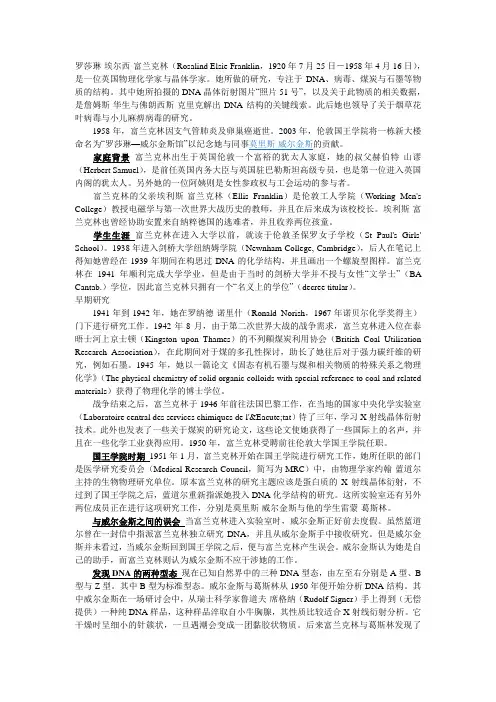
罗莎琳·埃尔西·富兰克林(Rosalind Elsie Franklin,1920年7月25日-1958年4月16日),是一位英国物理化学家与晶体学家。
她所做的研究,专注于DNA、病毒、煤炭与石墨等物质的结构。
其中她所拍摄的DNA晶体衍射图片“照片51号”,以及关于此物质的相关数据,是詹姆斯·华生与佛朗西斯·克里克解出DNA结构的关键线索。
此后她也领导了关于烟草花叶病毒与小儿麻痹病毒的研究。
1958年,富兰克林因支气管肺炎及卵巢癌逝世。
2003年,伦敦国王学院将一栋新大楼命名为“罗莎琳—威尔金斯馆”以纪念她与同事莫里斯·威尔金斯的贡献。
家庭背景富兰克林出生于英国伦敦一个富裕的犹太人家庭,她的叔父赫伯特·山谬(Herbert Samuel),是前任英国内务大臣与英国驻巴勒斯坦高级专员,也是第一位进入英国内阁的犹太人。
另外她的一位阿姨则是女性参政权与工会运动的参与者。
富兰克林的父亲埃利斯·富兰克林(Ellis Franklin)是伦敦工人学院(Working Men's College)教授电磁学与第一次世界大战历史的教师,并且在后来成为该校校长。
埃利斯·富兰克林也曾经协助安置来自纳粹德国的逃难者,并且收养两位孩童。
学生生涯富兰克林在进入大学以前,就读于伦敦圣保罗女子学校(St Paul's Girls' School)。
1938年进入剑桥大学纽纳姆学院(Newnham College, Cambridge),后人在笔记上得知她曾经在1939年期间在构思过DNA的化学结构,并且画出一个螺旋型图样。
富兰克林在1941年顺利完成大学学业,但是由于当时的剑桥大学并不授与女性“文学士”(BA Cantab.)学位,因此富兰克林只拥有一个“名义上的学位”(decree titular)。
早期研究1941年到1942年,她在罗纳德·诺里什(Ronald Norish,1967年诺贝尔化学奖得主)门下进行研究工作。
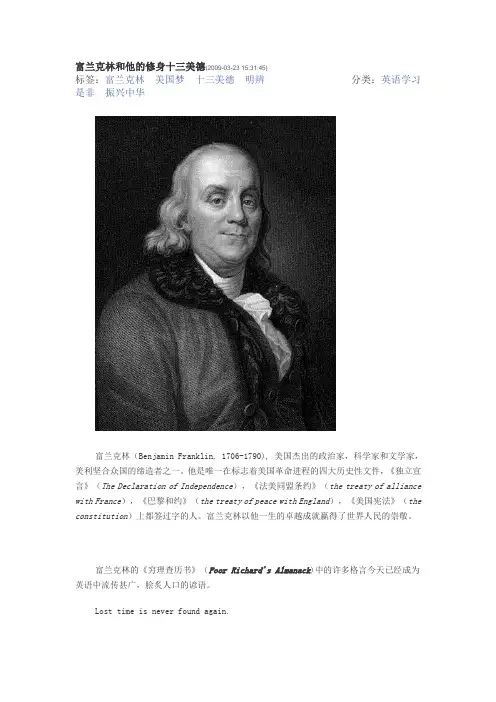
富兰克林和他的修身十三美德(2009-03-23 15:31:45)标签:富兰克林美国梦十三美德明辨分类:英语学习是非振兴中华富兰克林(Benjamin Franklin, 1706-1790), 美国杰出的政治家,科学家和文学家,美利坚合众国的缔造者之一。
他是唯一在标志着美国革命进程的四大历史性文件,《独立宣言》(The Declaration of Independence),《法美同盟条约》(the treaty of alliance with France),《巴黎和约》(the treaty of peace with England),《美国宪法》(the constitution)上都签过字的人。
富兰克林以他一生的卓越成就赢得了世界人民的崇敬。
富兰克林的《穷理查历书》(Poor Richard's Almanack)中的许多格言今天已经成为英语中流传甚广,脍炙人口的谚语。
Lost time is never found again.时光一去不复返/还。
A penny saved is a penny earned.省下一分钱就是挣了一分钱。
God helps those who help themselves.自助者,天助之。
Fish and visitors stink in three days.鱼放三天臭;客留三天主人烦。
Early to bed, and early to rise, makes a man healthy, wealthy, and wise.早睡早起,健康,富有,明智。
富兰克林的《自传》(The Autobiography of Benjamin Franklin)是美国文学史上第一部优秀传记。
富兰克林的精神是美国清教主义传统中务实以奉上帝的思想的代表,是17世纪北美移民开拓精神的继续和美国梦(The American Dream)的集中体现。
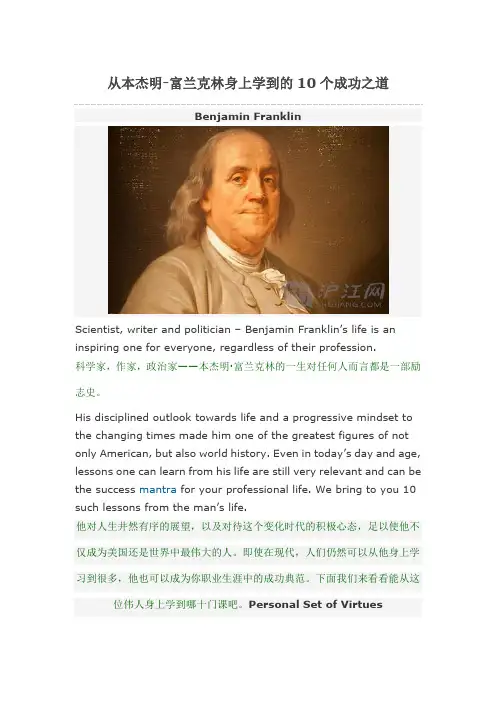
从本杰明-富兰克林身上学到的10个成功之道Benjamin FranklinScientist, writer and politician –Benjamin Franklin’s life is an inspiring one for everyone, regardless of their profession.科学家,作家,政治家——本杰明·富兰克林的一生对任何人而言都是一部励志史。
His disciplined outlook towards life and a progressive mindset to the changing times made him one of the greatest figures of not only American, but also world history. Even in today’s day and age, lessons one can learn from his life are still very relevant and can be the success mantra for your professional life. We bring to you 10 such lessons from the man’s life.他对人生井然有序的展望,以及对待这个变化时代的积极心态,足以使他不仅成为美国还是世界中最伟大的人。
即使在现代,人们仍然可以从他身上学习到很多,他也可以成为你职业生涯中的成功典范。
下面我们来看看能从这位伟人身上学到哪十门课吧。
Personal Set of Virtues1. Personal Set of Virtues自己的美德标准The joy of success is rendered hollow if the road to it is paved by vicious acts. In the long run, it always helps to have a personal code of conduct and live by them in the strictest way possible. Franklin had his own list of 13 virtues that he tried to emulate in his daily actions and used to keep track of how well he had been doing so. Not only does it make you a better man, but your work or business is also thrown into a good light.如果成功的道路铺满了罪恶,那么成功的喜悦也只是虚无。
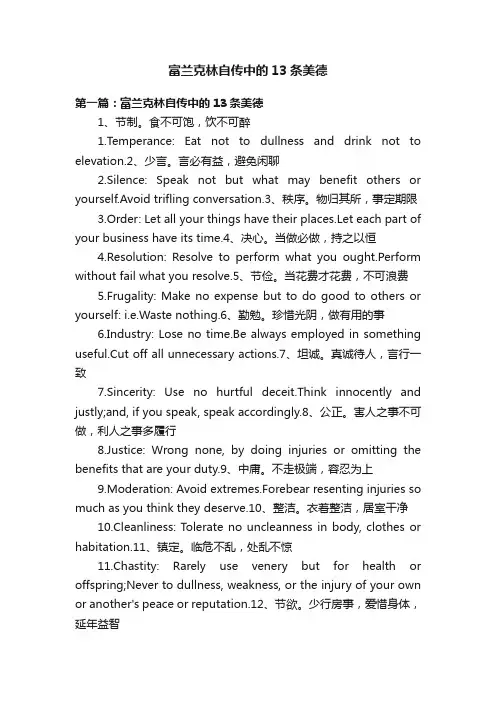
富兰克林自传中的13条美德第一篇:富兰克林自传中的13条美德1、节制。
食不可饱,饮不可醉1.Temperance: Eat not to dullness and drink not to elevation.2、少言。
言必有益,避免闲聊2.Silence: Speak not but what may benefit others or yourself.Avoid trifling conversation.3、秩序。
物归其所,事定期限3.Order: Let all your things have their places.Let each part of your business have its time.4、决心。
当做必做,持之以恒4.Resolution: Resolve to perform what you ought.Perform without fail what you resolve.5、节俭。
当花费才花费,不可浪费5.Frugality: Make no expense but to do good to others or yourself: i.e.Waste nothing.6、勤勉。
珍惜光阴,做有用的事6.Industry: Lose no time.Be always employed in something useful.Cut off all unnecessary actions.7、坦诚。
真诚待人,言行一致7.Sincerity: Use no hurtful deceit.Think innocently and justly;and, if you speak, speak accordingly.8、公正。
害人之事不可做,利人之事多履行8.Justice: Wrong none, by doing injuries or omitting the benefits that are your duty.9、中庸。
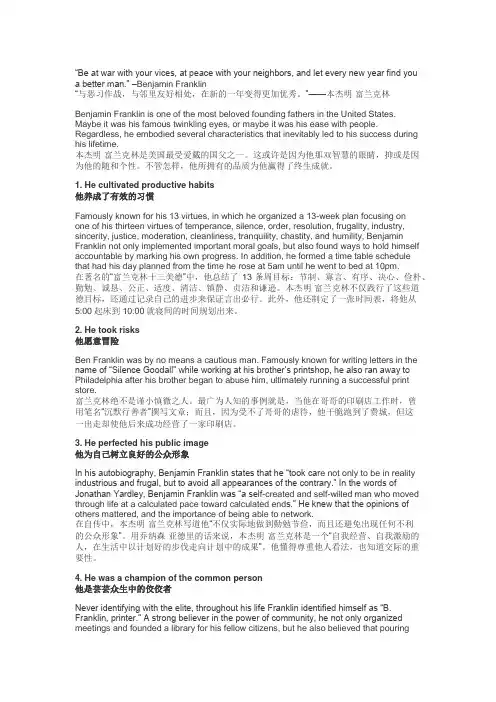
―Be at war with your vices, at peace with your neighbors, and let every new year find youa better man.‖ –Benjamin Franklin―与恶习作战,与邻里友好相处,在新的一年变得更加优秀。
‖——本杰明·富兰克林Benjamin Franklin is one of the most beloved founding fathers in the United States. Maybe it was his famous twinkling eyes, or maybe it was his ease with people. Regardless, he embodied several characteristics that inevitably led to his success during his lifetime.本杰明·富兰克林是美国最受爱戴的国父之一。
这或许是因为他那双智慧的眼睛,抑或是因为他的随和个性。
不管怎样,他所拥有的品质为他赢得了终生成就。
1. He cultivated productive habits他养成了有效的习惯Famously known for his 13 virtues, in which he organized a 13-week plan focusing onone of his thirteen virtues of temperance, silence, order, resolution, frugality, industry, sincerity, justice, moderation, cleanliness, tranquility, chastity, and humility, Benjamin Franklin not only implemented important moral goals, but also found ways to hold himself accountable by marking his own progress. In addition, he formed a time table schedule that had his day planned from the time he rose at 5am until he went to bed at 10pm.在著名的―富兰克林十三美德‖中,他总结了13条周目标:节制、寡言、有序、决心、俭朴、勤勉、诚恳、公正、适度、清洁、镇静、贞洁和谦逊。
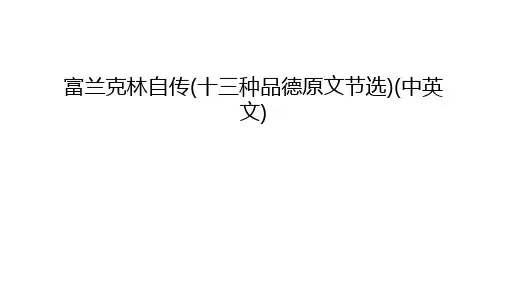
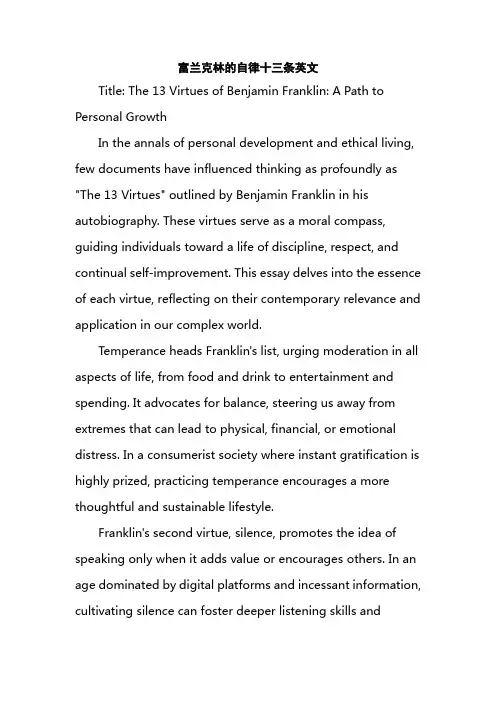
富兰克林的自律十三条英文Title: The 13 Virtues of Benjamin Franklin: A Path to Personal GrowthIn the annals of personal development and ethical living, few documents have influenced thinking as profoundly as "The 13 Virtues" outlined by Benjamin Franklin in his autobiography. These virtues serve as a moral compass, guiding individuals toward a life of discipline, respect, and continual self-improvement. This essay delves into the essence of each virtue, reflecting on their contemporary relevance and application in our complex world.Temperance heads Franklin's list, urging moderation in all aspects of life, from food and drink to entertainment and spending. It advocates for balance, steering us away from extremes that can lead to physical, financial, or emotional distress. In a consumerist society where instant gratification is highly prized, practicing temperance encourages a more thoughtful and sustainable lifestyle.Franklin's second virtue, silence, promotes the idea of speaking only when it adds value or encourages others. In an age dominated by digital platforms and incessant information, cultivating silence can foster deeper listening skills andprevent needless misunderstandings or conflicts.Orderliness, the third virtue, underscores the importance of organization and cleanliness in one's environment. By maintaining order in our surroundings, we create a physical space that supports mental clarity and efficiency, translating to better productivity and peace of mind.Resolution follows, advocating for decisiveness and proactive goal-setting. In a world rife with distractions and constant change, this virtue encourages us to set clear objectives and pursue them with determination, preventing stagnation and confusion.Frugality, Franklin's fifth virtue, champions simplicity and resourcefulness. It speaks directly to the modern challenge of sustainability, promoting a lifestyle that values utility over luxury and wastefulness.Industry, the sixth virtue, celebrates hard work and perseverance. It reminds us that success often stems from consistent effort and dedication rather than mere talent or luck.Sincerity, the seventh virtue, calls for authenticity and honesty in our interactions. Amid the curated façades prevalent on social media, sincerity demands that we remaintrue to ourselves and others, fostering genuine connections and trust.Franklin's eighth virtue, justice, implores impartiality and fairness in our judgments. It challenges us to base our decisions on merit and fact rather than prejudice or personal biases.Moderation, the ninth virtue, echoes temperance but applies specifically to physical exercise and the care of one's health. It advises against extremes in dietary or fitness routines, promoting a balanced approach to well-being.Cleanliness, the tenth virtue, emphasizes personal hygiene and tidiness. In a time when health has become paramount, cleanliness not only boosts personal morale but also respects the well-being of those around us.Tranquility, Franklin's eleventh virtue, advocates for an even-tempered disposition and the avoidance of unnecessary tension or anxiety. It suggests a mindful approach to stress, seeking peaceful resolutions rather than reacting impulsively.Chastity, as the twelfth virtue, promotes sexual responsibility and respect in relationships. It speaks to the importance of consent, mutual respect, and the sanctity of emotional bonds.Finally, humility, Franklin's thirteenth virtue, reminds us of the value of modesty and openness to criticism. It counters the ego-driven culture prevalent on social platforms, encouraging self-reflection, continuous learning, and a willingness to acknowledge our shortcomings.In conclusion, Benjamin Franklin's 13 Virtues offer timeless wisdom for those seeking to live a principled and fulfilling life. They resonate deeply in today's world, providing a framework for navigating the complexities of modern society with integrity and purpose. By embodying these virtues, we not only elevate our personal character but also contribute to the betterment of our communities and the world at large.。
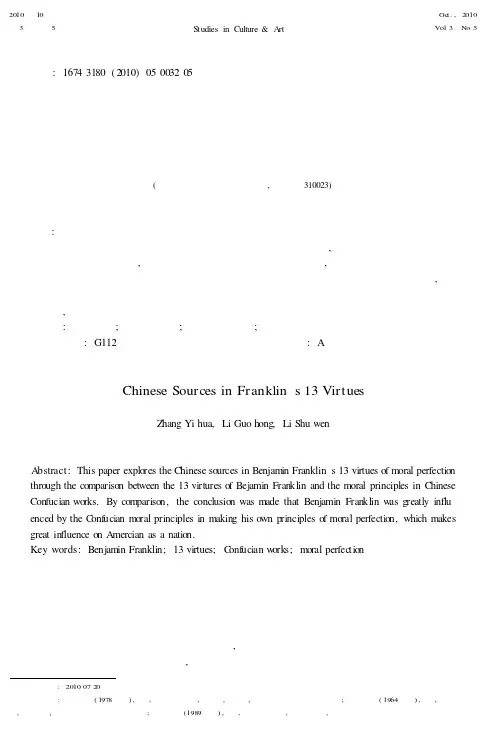
收稿日期作者简介章以华(),女,浙江象山人,讲师,硕士,主要从事比较文学研究;李果红(6),女,湖南益阳人,副教授,主要从事跨文化交际研究;李舒文(),女,浙江杭州人,本科学生,主要从事英语语言文学研究。
文章编号:16743180(2010)05003205富兰克林十三项美德的中国渊源章以华李果红李舒文(浙江工业大学外国语学院,杭州310023)摘要:富兰克林在他的自传中提出了节制、沉默寡言、生活有秩序、决断、俭朴、勤劳、诚恳、正直、中庸、清洁、宁静、贞节、谦虚等十三项美德,这些美德充分体现了西方文化中的实用主义精神,指导一代又一代的美国人实现美国梦,却鲜少有人关注其思想来源。
本文采用影响研究理论所倡导的由果溯源的模式来解读富兰克林的十三项美德,并通过对比这十三项修身美德和相应的中国文本中的道德修养准则来考证富兰克林对中国文化的汲取,从而探寻这十三项美德与中国传统儒家文化的渊源。
关键词:富兰克林;十三项美德;孔子儒家传统;道德修养中图分类号:G112文献标识码:AChinese Sources in Franklin s 13VirtuesZ hang Yi hua,Li Guo h ong ,Li Shu wenA bstract:This paper explo res the Chinese so urces in Benjamin Franklin s 13virtues o f moral perfectio nthro ugh the co mpariso n between the 13virtures o f Bejamin Fran klin and the moral principles in ChineseCon fucian wo rks.By co mpariso n,the conclusio n was made that Benjamin Fran klin w as g reatly influenced by the C onf ucian mo ral principles in makin g his o wn p rinciples o f mo ral perfectio n,which makesgreat in fluence o n A mercian as a natio n.Key words:Benjamin Franklin;13virtues;C onf ucian w o rk s;mo ral perfec tio n一、引言本杰明富兰克林是一个至今仍令美国人骄傲不已的名字。
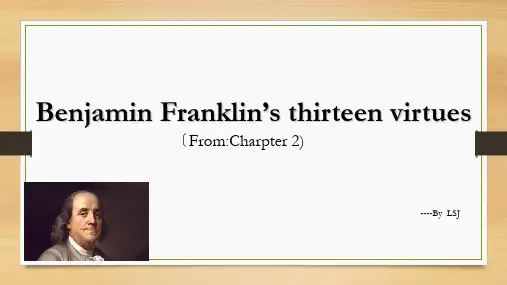
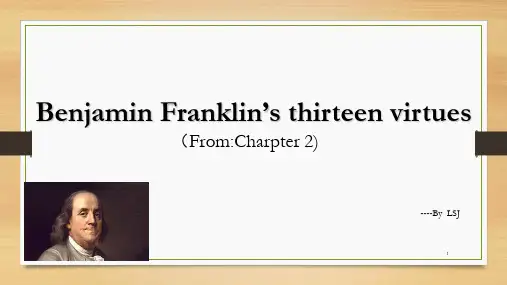

富兰克林和他的修身十三美德Thirteen Names of Franklin’s Virtues富兰克林(Benjamin Franklin, 1706-1790), 美国杰出的政治家,科学家和文学家,美利坚合众国的缔造者之一。
他是唯一在标志着美国革命进程的四大历史性文件,《独立宣言》(The Declaration of Independence),《法美同盟条约》(the treaty of alliance with France),《巴黎和约》(the treaty of peace with England),《美国宪法》(the constitution)上都签过字的人。
富兰克林以他一生的卓越成就赢得了世界人民的崇敬。
富兰克林的《穷理查历书》(Poor Richard's Almanac)中的许多格言今天已经成为英语中流传甚广,脍炙人口的谚语。
Lost time is never found again.时光一去不复返/还。
A penny saved is a penny earned.省下一分钱就是挣了一分钱。
God helps those who help themselves.自助者,天助之。
Fish and visitors stink in three days.鱼放三天臭;客留三天主人烦。
Early to bed, and early to rise, makes a man healthy, wealthy, and wise.早睡早起,健康,富有,明智。
富兰克林的《自传》(The Autobiography of Benjamin Franklin)是美国文学史上第一部优秀传记。
富兰克林的精神是美国清教主义传统中务实以奉上帝的思想的代表,是17世纪北美移民开拓精神的继续和美国梦(The American Dream)的集中体现。
它在一定程度上反映了资本主义上升时期北美人民觉醒,追求自由繁荣和憧憬未来的时代风貌。
Benjamin Franklin:“The First American"本杰明·富兰克林:“美国第一人"How does one characterize Benjamin Franklin? Journalist,scientist, educator, politician, writer,administer, philosopher—he truly seemed to be able to do everything。
His accomplishments and the talents and interests which he displayed during the course of his long life—1706 to 1790—have caused him to be called both “the first American" and “the last universal man”.谈到本杰明·富兰克林,你会想到他的哪些身份呢?记者、科学家、教育家、政治家、作家、管理者以及哲学家……集多重身份于一身的本杰明·富兰克林似乎无所不能。
他生于1706年,猝于1790年。
他天赋异禀,兴趣广博,一生中取得成就无数,赢得了“美国第一人”及“世界知名最后一人”的称号。
Historian Samuel Eliot Morison gives this view of the man:“Franklin's secret, the thing that ‘made him tick’ and pulled every aspect of his mind together,was his love of people. He talked with English and French statesmen as an equal; he was as homely and comfortable as an old shoe。
The First American--Influence from Benjamin Franklin’s Autobiography and “Thirteen Virtues” on the Forming of American DreamIntroductionBorn in 1706, Benjamin Franklin was brought up in a poor and obscure family, as he says in his Autobiography.His father is a candle—maker, his mother is a pious Calvinist. When he was 16 years old, he began to serve as an apprentice to his older half-brother, a printer. It was also in that year when Ben tried to publish his essays under his pseudonym, Silence Dogood. At 17, Ben ran to Philadelphia to make his own fortune. His entrance into this city marked the beginning of a long story of success or American Dream. In 1730, at the age of 24, Franklin acknowledged that he has an illegitimate son named William, despite that his mother’s identity is still unknown. The famous Autobiography is written to William as it began: My dear son. Franklin was also known as a prodigious inventor, one of his abundant inventions, the most famous one is electricity. Besides, he helped to found the Pennsylvania hospital, an academy which led to the University of Pennsylvania, and the American Philosophical Society. Among those things which he started and for which he was still remembered today were volunteer fire departments, effective street lighting, the Franklin stove, bifocal glasses, and efficient heating devices.The Autobiography of Benjamin Franklin was probably the first autobiography in American literature. After its publication, millions kinds of similar works were imitated day and night. Autobiography generally recorded a man who grew from an unknown boy to a man of wealth and prosperity. It was written in the form of letter and divided into four parts, completed at different times. Franklin was 65 years old when he began to write it, but he died before he could finished the whole book, which was a great pity for readers who were fascinated with his works. In Autobiography, Franklin asked the question of how a man should live his life, and he offered the bestanswer he could do by himself, which provided the mould of American life and influenced American spirit in a long period.In Autobiography, the most famous part is the Thirteen Virtues of Temperance, Silence, Order, Resolution, Frugality, Industry, Sincerity, Justice, Moderation, Cleanness, Tranquility, Chastity, and Humility. Franklin is not a man who gave up something which is difficult to achieve. He is a man who made his dream become reality once he made up his mind to do it. For example, he recorded how he achieved the thirteen virtues step by step.I made a little book, in which I allotted a page for each of thevirtues. I ruled each page with red ink, so as to have sevencolumns, one for each day of the week, marking the beginning ofeach line with a letter for the day. I crossed these columns with13 red lines, marking the beginning of each line with the firstletter of one of the virtues, on which line , and in its propercolumn I might mark, by a little black spot, every fault I foundupon examination to have committed respecting that virtue uponthat day.(常耀信,1996:126)All these illustrated how Franklin tries to restrain himself and realize his dream in his time. How he becomes a great man in American history and how he influences the forming of American Dream in the following time.Chapter One Franklin and the “Thirteen Virtues”in His AutobiographyBenjamin Franklin’s Autobiography and the “Thirteen Virtues” in ItIn a day and age when few men are thinking about their own or anyone else’s character development, thoughtful men must look to the past to gain inspiration. Benjamin Franklin, one of the American Revolution’s most notable figures is such an inspiration. He was a Founding Father of the United States, a polymath, author, printer, inventor, postmaster, Rosicrucian and Freemason. He invented the lightening rod, bifocal lenses, the Franklin stove, the carriage odometer, the glass harmonica. He founded the first lending library and the first Fire Department in Pennsylvania.The Autobiography of Benjamin Franklin is a record of self- examination and self-improvement. When we read the Autobiography,we can see an old man who was sitting there and told us an old story about his own life and his experience of his past life. He told us how to perfect ourselves by reading, working and learning. He taught us with pen in hand, drawing out the form of how he combated with his evil shortcomings step by step, day by day, how he succeed at last. According to his own story, he seemed to tell us that nothing is impossible; we can become somebody sooner or later once we do it. Franklin believed that everyone could communicate with god, which is also part of his religious belief. The Autobiography was Franklin’s life long work that he dedicated to expressing his every thought and belief. Arriving in New England at about 1682, Benjamin Franklin’s father, Josiah, found that English Conventicler were often disturbed by English laws and that they “induced some considerable Men of his Acquaintance to remove to that Country, and he was prevailed with to accompany them thither, where they expected to enjoy their Mode of Religion with Freedom” (Bastain,Peter,2005:83). The Autobiography is therefore Franklin’s embodiment of expression that had his family remained in England would have been impossible to achieve. What makes Franklin’s mo de of expression unique is that it draws exclusively on the self and allows the self to develop into a cohesive whole without the government imposing on it. Living in a land like America where its citizens could express themselves freely, writers like Franklin were able to establish a mode of expression that everyone could accurately represent themselves freely. Itcould then be argued that the first step in attaining the American dream was to reject Old World Values and adopt New World ones in place.Franklin sought to cultivate his character by a plan of thirteen virtues, which he developed at age 20 (in 1726) and continued to practice in some form for the rest of his life. His autobiography lists his thirteen virtues as:Temperance:“Eat not to dullne ss; drink not to elevation”;Silence:“Speak not but what may benefit others or yourself; avoid trifling conversation”;Order:“Let all your things have their places; let each part of your business have i ts time”; Resolution: “Resolve to perform what you ought; perfor m without fail what you resolve”; Frugality:“Make no expense but to do good to others o r yourself; ., waste nothing”; Industry:“Lose no time; be always employ’d in something useful; cut off all unnecessary actions”; Sincerity: “Use no hurtful deceit; think innocently and justly, and, if you speak, speak accordingly”; Justice: “Wrong none by doing injuries, or omitting the benefits that are your duty”; Moderation:“Avoid extremes; forbear resenting injuries so much as you think they deserve”; Cleanliness:“Tolerate no uncleanliness in body, cloaths, or habitation”; Tranquility: “Be not disturbed at trifles, or at accidents common or unavoidable”; Chastity:“Rarely use venery but for health or offspring, never to dullness, weakness, or the injury of your own or another’s peace or reputation”;Humility: “Imitate Jesus and Socrates.”(常耀信,1991: 124)Franklin did not try to work on them all at once. Instead, he would work on one and only one each week“leaving all others to their ordinary chance”. While Franklin did not live completely by his virtues and by his own admission, he fell short of them many times, he believed the attempt made him a better man contributing greatly to his success and happiness, which is why in his autobiography, he devoted more pages to this plan than to any other single point; in his autobiography Franklin wrote, “I hope, therefore, that some of my descendants may follow the example and reap the benefit.”(常耀信,1991:123-127)The Deep Meaning of the “Thirteen Virtues”Ben believed that man is basically good and free by nature; everyone owns unalienable right to pursue happiness and liberty. One of the 13 virtues he listed for himself is “order”, which is also one of the principle of the Age of Reason and the slogan of 18th century, just as Alexander Pope advocated in his contemporary that heroic couplet is the rigid form of his school. Then there comes “moderation”:“avoid extremes,” Franklin told himself and his fellowmen. As is known all, moderation and temperance were among the best virtues of men in that time. All of the 13 virtues are an impressive record of a man trying to be value to mankind: Franklin spent his whole life doing all kinds of things for the welfare of the world, as indeed we mentioned a little earlier. Creating as it does the image of a boy’s rise from rags to riches, the book demonstrates Franklin’s confident belief that the new world of America is a land of opportunities which might be met through hard work and with management, thus telling a story of self-reliance. “Industry” referred in the13 virtues best illustrated it in detail. Franklin was supremely human. He knew humanity’s foibles and deficiencies, but he was convinced that man is good and capable of becoming better, and that, although man and institutions are often corrupt, they might be improved. Had this belief failed to triumph over the doctrine of people like Jonathan Edwards, the American Revolution would be impossible.Benjamin Franklin’s Autobiography is a strict stance against old world values. The main old view value stated that “the Christian Church must deliver the laws which she hath received from her King, not dare make laws” (Abbott, H. Porter, 2002:45). A key eighteenth century figure like Benjamin Franklin valued higher law values because allowing the government to interpret biblical passages the King could always place his own slant to make it seem that God ordained his leadership. Higher law practices instead advanced that God’s p ower was absolute and that no earthly being could rule the world. Franklin followed the New World belief because he lived his life with temperance, silence, order, resolution, frugality, industry, sincerity, justice,moderation, cleanliness, tranquility, chastity, and humility. Moreover, Franklin stressed how he “determined to give a Week’s strict Attention to each of the Virtues successively” (Campbell, James,1999:58).Franklin’s schedule followed the New World’s tenants because he felt that church attendance was not mandatory to live life the way God ordained. Furthermore, Franklin’s virtues rejected English kings who would praise God’s word as their own and indulge in wealth while many citizens suffered from poverty. By placing the words “Week”, “Attention”, and “Virtues” in upper-case, Franklin stressed that his Virtues must be followed rigorously. Franklin spent an entire week on every Virtue and would move on to the next one only once he would not sway from the week’s Virtue in any way. Swaying from th e week’s Virtue meant that Franklin would have to start the entire cycle over again. Perfecting the entire cycle is what made him the astute and hard working individual who accomplished tremendous feats and discovered significant technical innovations such as electricity that we still used today. Benjamin Franklin believed that every American must perfect each virtue in order to attain the America dream and make America into a great world power.Chapter 2 The Influence of Autobiography and “Thirteen Virt ues” on the Forming of American DreamFranklin set an example for self-made man by constant study and ceaseless pruning for a perfect character he improved himself from a poor boy with 2 years education to one of the greatest and most influential man in the world with multiple identities as a businessman writer statesman scientist diplomat philosopher patriot and man of the work. He embodies and personifies the American dream. The autobiography is an inspiring account of a poor boys rise to wealth and fame and the fulfillment of the American dream. Franklin proved how little necessary all origin is to happiness, virtue or greatness and that with determination and dedication success is within anyone’s grasp. What’s more, Franklin put strong emphasis on morality and personalvalues, just as the “humility” “sincerity”and “moderation”he referred in the 13 virtues. It is he who made a perfect definition of the American dream linking morality and personal values with material success and who set a good example for people of both his time and subsequent generation. He also made contribution to all sects that were to be erected. At the heart of Franklin’s work was an unshakable pragmatism a concern with the means by which humans can improve themselves and their environments. In his invention of the Franklin stove the maxims of Poor Richard his establishment of the Junto and a circulating library and his bold and arduous Project of arriving at moral Perfection we can see a commitment to human progress through human initiative. For instance Franklin had infinite hope for the potential of science to improve human life. For centuries he has widespread and profound influence over people around the world and inspired millions of people holding dreams for success within. There is an ocean of benefits to study his work so that we can receive more lights from him to pursue our own dreams.Franklin is one of the founders of America; he practiced American Dream throughout his whole life and noted them down in his Autobiography. He even wrote such kind of dream into American Constitution and The Independence of America, which influenced the whole nation for hundreds of years. American believed that everyone could become a millionaire or a successful man once he devoted his effort and energy to his work with self- discipline and self- restraint, despite of his social status, property, family background and education background. In certain degree, Franklin is a typical example of the result of American Dream. He was born into a poor family, and made living when he was still a little boy. He never gave up no matter what kind of hardships were waiting for him. Finally, he became somebody from nobody, from rags to riches. Therefore, his Autobiography can also be regarded as a diary of a man teaching us how to stand on the top of the society, how he keeps “length of days in his right hand, and in his left hand riches and honor.” and how he makes his way become “ways of pleasantness and all his paths are peace.”(Bastain, Peter,2005:85)Generally speaking, Franklin performed American Dream with his whole life.Eighteenth century America was driven primarily by an awareness of expansion. The modern reader may have some difficulty grasping how Colonial Americans defined the America dream as be ing one of endless possibility. Franklin’s classification of the American dream implied an ideal that everyone had the chance to achieve the Jeffersonian ideal of life, liberty, and the pursuit of happiness. For Franklin, the American dream was possible for anyone who had the willingness to work hard and honestly. In Franklin’s estimation, anyone who would abide by this maxim would either achieve success or be emulated for their effort. Even those who did not achieve their goal would still have made a contribution to their nation because they followed the understanding that hard labor and honesty are qualities that everyone must strive for.Benjamin Franklin has traditionally been defined as a self-made man and rugged American individualist. The Autobiography is structured primarily around several errata that Franklin learned from throughout his life. American dream was to constantly correct one’s errors until these errors were eradicated into good personal qualities or at least to have learned never to commit them again What Franklin intended in his Autobiography was to explain to his readership how he understood his errors and how and why to correct them. Writing therefore became Franklin’s manner of explaining his wrongs and explicitly stating that he will never commit that particular wrong again. Franklin’s mode of conveying his sage was an effective one given that the reader is drawn into the narrative by Franklin’s assertive tone and will likely not commit the same errors.ConclusionAll in all, Franklin is not only a person who made great contribution to American physical life, but also played a decisive role in forming the spirit of America. He taught American people how to pursue their own happiness, how to overcome hardships in front of danger, how to restrain themselves with Puritan disciplines. Franklin performed American dream within his whole life. He is the first Americanwho was good at everything and devoted his whole life into the service of mankind. After Franklin died, there was no person who could be compared with him any more. He is such a great person that his doings influenced generation after generation. Besides, his Autobiography became a treasure in the history of American literal history, until today, it was read by millions of people in the world, which has been regarded as a guideline to success. For the thirteen virtues in the Autobiography, all of which are regarded as the principle of action in people’s daily life.Bibliography1.Abbott, H. Porter. The Cambridge Introduction toNarrative. New York:Cambridge University Press,2002.2.Bronson, W. C. A Short History of America Literature.Boston, Heath, 1900.3.Bastain, Peter. “Let’s Do Lunch: Benjamin Franklin and theAmerican Character.”Australasian Journal of AmericanStudies (2005): 83-89.4.Campbell, James. Recovering Benjamin Franklin: AnExploration of a Live of Science and Service. Chicago:Open Court, 1999.5.J. A. Leo Lemay, ed.Autobiography, Poor Richard,& Later Writings. Library of America, 1987 one-volume,2005 two-volume.6.本杰明富兰克林. 富兰克林自传[M]. 江石亮,许国平译. 上海: 东方出版社中心,1999.7.常耀信. 美国文学选读(上册)[M]. 南开大学出版社,1991. 120-1378.杨自伍. 美国文化选读(上册)[M]. 上海: 华东师范大学出版社,1997. 2-3.。
富兰克林生平事迹富兰克林的生平事迹导读:我根据大家的需要整理了一份关于《富兰克林的生平事迹》的内容,具体内容:富兰克林,著名的政治家、外交家、哲学家、文学家以及美国独立战争的伟大领袖。
富兰克林是美国历史上第一位享有国际声誉的科学家和发明家。
下面是我跟大家分享的富兰克林事迹,欢迎大家来阅读学习~...富兰克林,著名的政治家、外交家、哲学家、文学家以及美国独立战争的伟大领袖。
富兰克林是美国历史上第一位享有国际声誉的科学家和发明家。
下面是我跟大家分享的富兰克林事迹,欢迎大家来阅读学习~富兰克林简介1.人物介绍本杰明富兰克林(BenjaminFranklin)(1706.1.17—1790.4.17)是 18 世纪美国的实业家、科学家、社会活动家、思想家、文学家和外交家。
他是美国历史上第一位享有国际声誉的科学家和发明家。
为了对电进行探索曾经作过著名的"风筝实验",在电学上成就显著,为了深入探讨电运动的规律,创造的许多专用名词如正电、负电、导电体、电池、充电、放电等成为世界通用的词汇。
他借用了数学上正负的概念,第一个科学地用正电,负电概念表示电荷性质。
并提出了电荷不能创生、也不能消灭的思想,后人在此基础上发现了电荷守恒定律。
他最先提出了避雷针的设想,由此而制造的避雷针,避免了雷击灾难,破除了迷信。
这个震惊世界的实验还被苏教国标版语文第九册(五年级上册)介绍,为第 19 课《天火之谜》。
他是一位优秀的政治家,是美国独立战争的老战士。
他参加起草了《独立宣言》和美国宪法,积极主张废除奴隶制度,深受美国人民的崇敬。
他是美国第一位法国驻外大使,所以在世界上也享有较高的声誉。
2.人物生平他出身寒微,10 岁便辍学回家做工,12 岁起在印刷所当学徒、帮工.但他刻苦好学,在掌握印刷技术之余,还广泛阅读文学、历史、哲学方面的著作,自学数学和 4 门外语,潜心练习写作.他常常在做完了一天的工作后,到印刷厂的图书室阅读各种各样的书籍.有时看得入迷,直到夜幕降临,焦急的母亲来工厂找他,他才回家.所有这一切为他在一生中取得多方面的成就打下了坚实的基础.为了自立于当时的社会,他几经周折,创办了自己的企业——印刷所.由于吃苦耐劳,讲求信誉,注意经营管理,他不仅在印刷界激烈的竞争中站住了脚,并且把业务扩大到邻近几个州以及西印度群岛,成为北美洲印刷出版行业中的佼佼者.他注意观察自然现象,研究科学问题.他从实践出发,从事科学实验和观察,在电学上解答了"电为何物"的问题,将不同状态下的电称为"正电"和"负电",提出了电学中的"一流论",在大气电学方面揭示了雷电现象的本质,被誉为"第二个普罗米修斯".这些电学上划时代的研究成果使他成为蜚声世界的第一流的科学家.他在光学、热学、声学、数学、海洋学、植物学等方面也有研究,并有新式火炉、避雷针、电轮、三轮钟、双焦距眼镜、自动烤肉机、玻璃乐器、高架取书器、新式路灯等一系列发明创造.因而,他以仅读过两年小学的学历,被美国的哈佛大学、耶鲁大学,英国的牛津大学、爱丁堡大学、圣安德鲁大学等六七所大学授予硕士学位或博士学位.富兰克林成名以后在北美殖民地的文化传播和社会福利方面做了大量的工作.他先后组织建立了"共读社"、"美洲哲学学会"、"北美科学促进会"、报社、图书馆、书店、医院、大学、消防队、地方民兵组织等学术、文化、医疗卫生、消防、治安组织和机构;他还改革了北美殖民地的邮政制度,建立起北美殖民地统一的邮政系统.他是杰出的社会活动家,成为北美殖民地有影响的人物.他不仅善于解决自然科学里的专门问题和社会政治活动中的实际问题,还常常探索许多哲学问题和社会问题.他是自然神论者,认为精神依附于物质;他认为社会贫困的原因是劳动者必须养活寄生者;他酷爱自由和平,反对战争,痛恨种族歧视和奴隶制度,主张维护黑人和印第安人的利益.他是当时最渊博的资产阶级自思想家之一.富兰克林生活的时代正值美国从殖民地向独立的资产阶级国家迈进的重大转折时期,他积极投身革命运动,对独立战争的胜利和美国国家制度的初期建设作出了重大的贡献.在 1754 年北美各殖民地领导人物出席的奥尔巴尼议上,他提出著名的"奥尔巴尼联盟"的计划,被会议通过,成为最早将美利坚合众国的大联合这种思想灌输到殖民地人民头脑中去的人.在宾夕法尼亚,他始终同殖民地人民一道同业主集团的横行不法作斗争.1757 年,他代表州议会赴伦敦向英王请愿,要求业主交纳税款,取得成功;1764 年,他第二次赴伦敦,要求英王保护殖民地利益,没有结果.其后,英国政府加强对北美殖民地的镇压,激发了殖民地人民更强烈的反抗斗争.富兰克林的立场彻底转到革命方面.宾夕法尼亚原为业主殖民地,是 1681 年英王查理二世赐予威廉宾的土地.后来,威廉宾的两个儿子继承产业.业主在其领有的殖民地享有委派包括州长在内的官吏、否决议会议案、免交捐税等特权.1775 年 5月,他回到美洲,立即投入到革命斗争中去.他担任宾州治安委员会主席,主持地方军委,并和潘恩共同起草了州宪法;他作为宾州代表出席第二议,成为美国独立言的起草人之一;他担任美国邮政部长,组织战争期间的邮政,成绩显著;在美军作战屡次受挫的情况下,他作为三人委员会成员顿会商,决定实行北美13 州的总动员,使得独立战争得以坚持 6 年之久.在英强美弱的局势下,殖民地人民必须争取外援.富兰克林奉大陆会议之命出使法国,争取美法结盟,共同对英作战.在当时复杂而不利于美国的外交环境中,他以美国必胜的信念、坚韧不拔的耐心,巧妙灵活的外交手腕,利用欧洲国家之间的矛盾,抓住有利时机,缔结了美法同盟盟约,争取了人力、物力、财力上的大量外援,确保了独立战争的胜利.在战争后期,他参加并一度主持美英议和谈判,签订了有利于美国的英美和平条约,胜利地完成了艰巨的战时外交使命.战后,他成为新生的美国第一任驻法特命全权大使留法工作,直到 1785 年归国.回国以后,他连续 4 年当选宾夕法尼亚州长.在美国宪法会议上,他是宪法起草委员会委员,他为了调解会议代表的意见分歧而提出的议会的两院制,成为美国的基本国家制度之一.1788 年后,他不再担任公职,但仍发表政论文章,以供政府采择,并致力于促进废除奴隶制的活动.1790 年 4 月 17 日,富兰克林与世长辞.在他出殡的那一天,为他送葬的人数多达两万,充分表达了美国人民对他的痛悼之情.同时,不仅美国国会决定为他服丧一个月,法国国民议会也决议为他哀悼,表明了他不仅属于美国,也属于全世界!3.捕捉雷电1746 年,一位英国学者在波士顿利用玻璃管和莱顿瓶表演了电学实验。
本杰明_富兰克林本杰明·富兰克林(Benjamin Franklin)(1706.1.17—1790.4.17)是18世纪美国的实业家、科学家、社会活动家、思想家和外交家。
他是美国历史上第一位享有国际声誉的科学家和发明家。
为了对电进行探索曾经作过著名的“风筝实验”,在电学上成就显著,为了深入探讨电运动的规律,创造的许多专用名词如正电、负电、导电体、电池、充电、放电等成为世界通用的词汇。
他借用了数学上正负的概念,第一个科学地用正电、负电概念表示电荷性质。
并提出了电荷不能创生、也不能消灭的思想,后人在此基础上发现了电荷守恒定律。
他最先提出了避雷针的设想,由此而制造的避雷针,避免了雷击灾难,破除了迷信。
他是一位优秀的政治家,是美国独立战争的老战士。
他参加起草了《独立宣言》和美国宪法,积极主张废除奴隶制度,深受美国人民的崇敬。
他是美国第一位法国驻外大使,所以在世界上也享有较高的声誉。
1平庸的人最大缺点是常常觉得自己比别人高明。
2懒惰,像生锈一样,比操劳更能消耗身体,经常用的钥匙总是亮闪闪的。
3命运的变化犹如月之圆缺,对智者无妨害。
4我未曾见过一个早起、勤奋、谨慎、诚实的人抱怨命运不好;良好的品格,优良的习惯,坚强的意志,是不会被假设所谓的命运击败的。
5失足可以很快弥补,失言却可能永远无法补救。
6傻瓜的心在嘴里,聪明人的嘴在心里。
7 骄傲者憎恨他人骄傲。
8最难抑制的情感是骄傲,尽管你设法掩饰,竭力与之斗争,它仍然存在。
即使我敢相信已将它完全克服,我很可能又因自己的谦逊而感到骄傲。
9缺少谦虚就是缺少见识。
10虚荣是骄傲的食物,轻蔑是它的饮料。
11没有任何动物比蚂蚁更勤奋,然而它却最沉默寡言。
12骄傲道德导致丰盈,然后导致贫困,最后导致声誉扫地。
13绝望毁掉了一些人,而傲慢则毁掉了许多人。
14恶习知道自己委实很丑陋,所以往往戴了假面具。
15心胸开阔:不要为令人不快的区区琐事而心烦意乱,悲观失望。
16良好的态度对于事业与社会的关系,正如机油对于机器一样重要。
Benjamin Franklin (January 17, 1706–April 17, 1790) was one of the Founding Fa-thers of the United States. A noted polymath, Franklin was a leading author and prin-ter, political theorist, politician, postmaster, scientist, inventor, satirist, civic activist, statesman, and diplomat. As a scientist, he was a major figure in the American En-lightenment and the history of physics for his discoveries and theories regarding elec-tricity. He invented the lightning rod, bifocals, the Franklin stove, a carriage odome-ter, and the glass 'armonica'. He formed both the first public lending library in Ameri-ca and the first fire department in Pennsylvania.Franklin earned the title of "The First American" for his early and indefatigable cam-paigning for colonial unity; as an author and spokesman in London for several colo-nies, then as the first United States Ambassador to France, he exemplified the emerg-ing American nation. Franklin was foundational in defining the American ethos as a marriage of the practical and democratic values of thrift, hard work, education, com-munity spirit, self-governing institutions, and opposition to authoritarianism both po-litical and religious, with the scientific and tolerant values of the Enlightenment. In the words of historian Henry Steele Commager, "In a Franklin could be merged the virtues of Puritanism without its defects, the illumination of the Enlightenment with-out its heat."To Walter Isaacson, this makes Franklin "the most accomplished Ameri-can of his age and the most influential in inventing the type of society America would become."Franklin, always proud of his working class roots, became a successful newspaper editor and printer in Philadelphia, the leading city in the colonies. He was also part-ners with William Goddard and Joseph Galloway the three of whom published the Pennsylvania Chronicle, a newspaper that was known for its revolutionary sentiments and criticisms of the British monarchy in the American colonies.He became wealthy publishing Poor Richard's Almanack and The Pennsylvania Gazette. Franklin gained international renown as a scientist for his famous experiments in electricity and for his many inventions, especially the lightning rod. He played a major role in establishing the University of Pennsylvania and was elected the first president of the American Philosophical Society. Franklin became a national hero in America when he spear-headed the effort to have Parliament repeal the unpopular Stamp Act. An accom-plished diplomat, he was widely admired among the French as American minister to Paris and was a major figure in the development of positive Franco-American rela-tions. For many years he was the British postmaster for the colonies, which enabled him to set up the first national communications network. He was active in community affairs, colonial and state politics, as well as national and international affairs. From 1785 to 1788, he served as governor of Pennsylvania. Toward the end of his life, he freed his slaves and became one of the most prominent abolitionists.His colorful life and legacy of scientific and political achievement, and status as one of America's most influential Founding Fathers, have seen Franklin honored on coi-nage and money; warships; the names of many towns, counties, educational institu-tions, namesakes, and companies; and more than two centuries after his death, count-less cultural references.Book reportFranklin was not in favorable growth environment, and it should be a relatively plain appearance. In 1706 he was in North America, the home of 17 children. His father is involved in wax and soap as a small businessman, Franklin entered the school for about two years before dropping out of school because of family distress. Then he went to work as an apprentice in his brother’s shop, the apprentice days was very dif-ficult, but he did a good use of the apprenticeship leisure time to study hard, and read a lot of books in politics, science, history and literature. He was also proficient in the use of French, Italian, Spanish and Latin.In 1726 Franklin manages a printing factory, it was a great success which created a legend of the American dream, and he printed a huge impact ―Pennsylvania‖. He in-vented the lightning rod, dual-purpose glasses, new stove and new lights. He pio-neered the North American colonies the slogan that is ―not join the death‖ and drafted out the drafting of ―Declaration of Independence‖ published in 1771 which changed the fate of countless people, and this book gave a description of its process of growth and exhorted the people to be positive.(换ppt)There are a lot of Proverbs in this book that Franklin felt in his life, reading this book is not only to feel the sentiment, but also to combine their training and humanity and then to improve ourselves, the book describes each chapter are a true portrayal of his life and tell us how to get all the perception which inspired me very much.In his view, reading is the key to success. Books give us wisdom, strengthen our de-termination and let us have the wisdom of the trip of our life.Franklin attaches great importance to his virtue. Therefore, he proposed to 13 re-quirements for himself namely: control, quiet, orderly life, determination, frugality, diligence, sincerity, justice, moderation, cleanliness, tranquility, chastity and humility. He has been trying to do that, though he cannot completely meet all the requirements, but he was persistent. The people who can meet the 13 requirements can be called ―saints‖of the fact that people are rarely perfect, but it can pursue such a perfect people in the United States and Germany who have achieved great success. Franklin was revered as the father of America for his impressive image that can main-tain a frugal life style of work for the public welfare and make immortal contribu-tions, compared to the majority of people we can knew how impetuous we are.(huan) In this clear, crisply written story of his life, Benjamin Franklin shows the reader what his childhood was like and what he came to value as meaningful and worthwhile techniques of communication, conduct, and self-improvement. A conscientious and serious youth, Franklin nevertheless left his boyhood town because he had impreg-nated a young lady. This early act of responsibility led him to pursue work that led him, in the coming years of the American Revolution, to be a strong advocate of polit-ical independence, even at the cost of war. Franklin became as fine a statesman as ev-er the United States was to produce. One of the country's founding fathers and a tire-less champion of individual liberty, he also served as the American ambassador to France. He tells of how he learned the printing trade and how he established "Poor Richard's Almanac." He also shares with his readers his hopes for the free country that he helped to bring into being. The reader cannot help but admire this brilliant and brave founding father, as much for his humility as for his services to his country and its future citizens.(huan)名言Silence is not always a sign of wisdom, but babbling is ever a folly.沉默并不是智慧的标志,但唠叨永远是一项蠢行。